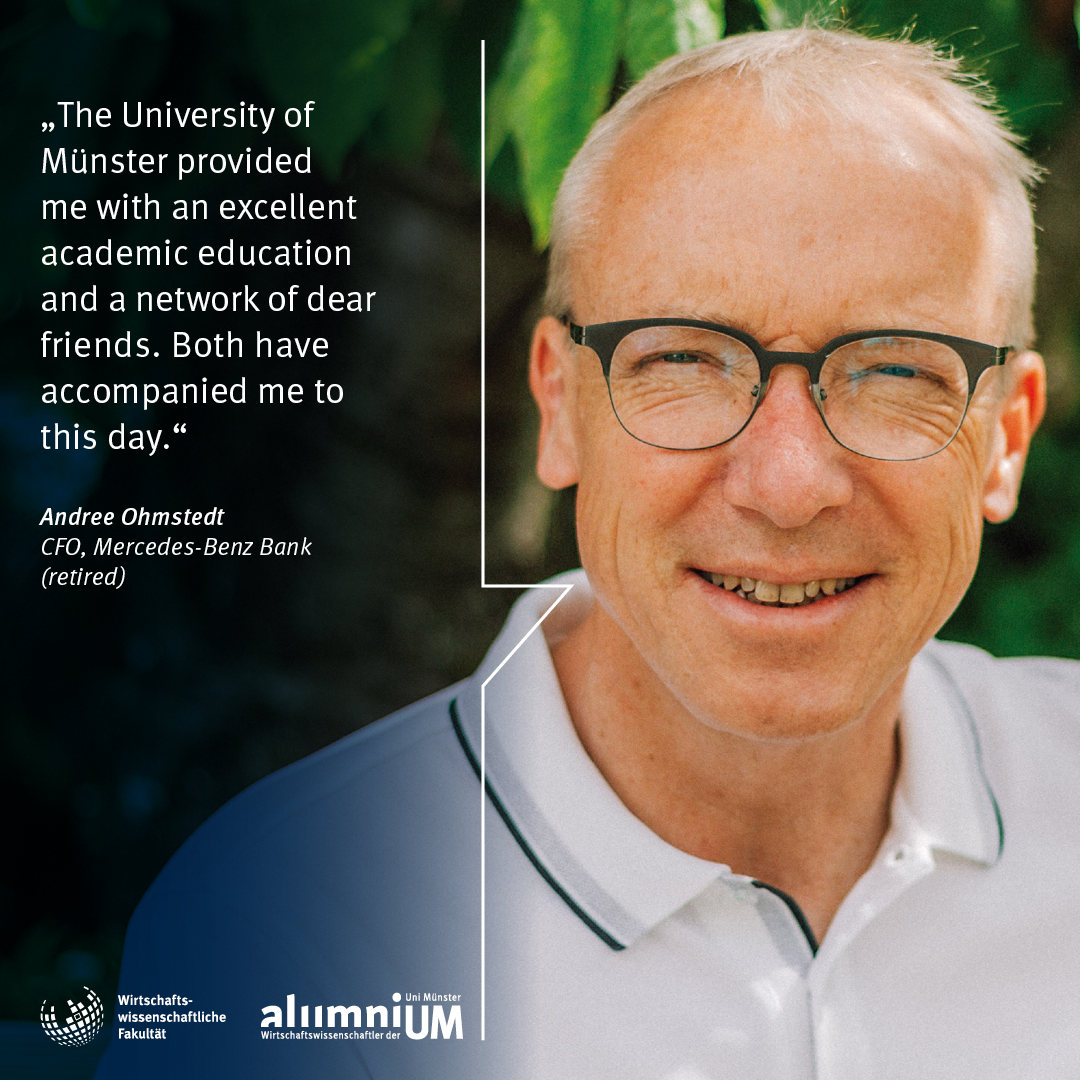Alumni Story: Andree Ohmstedt

"From Münster to the world"—this could be one way to describe the career of our alumnus, Andree Ohmstedt. Starting his career in the International Junior Staff Group at Daimler-Benz AG, Andree Ohmstedt remained loyal to the company for over 30 years. Beginning in corporate treasury, he quickly earned his first leadership role, followed by several other management positions across three continents. For more than 11 years, he served on the Board of the Mercedes-Benz Bank in Stuttgart, overseeing finances. Whether in South Africa, the U.S., or Europe, the foundation for these positions was laid at the University of Münster, where Andree Ohmstedt graduated with a degree in Business Administration in 1989.
In this interview, we look back on Andree Ohmstedt’s illustrious career and gain intriguing insights into his professional journey.
Dear Mr. Ohmstedt, you've spent your entire career with Daimler-Benz AG. What made this company the ideal employer for you?
At first glance, spending an entire career with Daimler-Benz AG might seem a bit boring. But far from it! The company’s size, international reach, diversity, and dynamic nature—wrapped around highly attractive products—required constant adaptation to an ever-changing environment.
Armed with a strong theoretical foundation, especially from three years studying Prof. Schierenbeck's Banking Administration, I was able to gain my first international experience near New York after four years in corporate refinancing. There, I built asset/liability management for American leasing and finance companies and was able to put "earnings-oriented bank management" into practice.
Four years later, I supported the idea of establishing a central office for Latin American financing activities in Miami. Unfortunately, this attractive role (and location) was cut short after nearly two years due to the merger with Chrysler. Instead of returning to Germany, I was entrusted with the CFO position of our South African operation. The country’s post-apartheid transformation reflected the company’s openness to new ideas and dynamism. After five exciting years, I moved back to the U.S., this time to Michigan. There, I took on the most exciting project of my career—the demerger of Daimler and Chrysler. This was particularly thrilling because the demerger’s epicenter was in the U.S., and the previously separate entities had been successfully integrated into a single DaimlerChrysler unit over eight years.
In 2009, my 15-year stint abroad finally came to an end. With two American-born children, my wife and I returned to Germany. Back in Stuttgart, my role as CFO of the Mercedes-Benz Bank allowed me to revisit earnings-oriented bank management and to experience banking regulation intensively. I hope this brief overview illustrates that a multifaceted and thrilling career was indeed possible within a single company.
As I approached 60, I decided to retire a bit earlier. Now, aside from supporting a few start-ups, I’ve been enjoying the many wonderful sides of life without a packed schedule for over three years.
Which of your international postings has had the most profound impact on you?
It’s hard to say, as each position left its mark.
In my early role within a young, fast-growing corporate treasury team, the rapid growth of financial services meant that our young team was given a great deal of trust and freedom, for example in establishing various innovative capital market instruments and hedging strategies.
In Miami, I learned that ideas that were promising yesterday may need to be abandoned due to shifting internal or external conditions. Supporting each team member as they processed this “shock” was crucial.
In South Africa, I experienced transformation and diversity firsthand. During this time, we tested new concepts, such as using balanced scorecard management and implementing shared service structures across local company divisions, which became benchmarks for others.
From my time in Michigan, I took away that (almost) nothing is impossible. After completing the structural, procedural, and IT separation of the company’s largest captive in seven months, accompanied by the challenging decision of where employees would continue their careers, I found myself better prepared for future challenges.
In Stuttgart, the growing demands of German and European banking supervision shaped my work; over time, I even started to enjoy addressing these challenges. My final projects included preparing for and initiating the separation of Mercedes-Benz (passenger cars and vans) from Daimler Trucks and Buses within the financial services division.
Looking back, what advice would you give to today’s graduates?
It doesn’t feel that long ago that I was on the receiving end of such advice. With a solid academic foundation from the University of Münster, it’s easier to make a mark through performance, particularly early in your career. However, you should always prioritize the success of the team or company over personal accomplishments, which ideally will be recognized. Building internal and external networks is crucial in many ways. In an increasingly dynamic world, a high degree of flexibility is essential. The challenge of not being able to fully imagine one's future job is something I find motivating rather than daunting. Personally, I have always worked well with team members who brought a constructive, critical form of open communication. Organizations that do not value these traits have always felt questionable to me.
What makes Münster special compared to other cities you’ve lived in?
Compared to Siegen, where I did my undergraduate studies, I came to appreciate Münster’s rich university (and pub) culture. During my 15 years in the U.S. and South Africa, I probably didn’t see as many bicycles as I did in a single day in Münster. Back then, I enjoyed getting everywhere in Münster by bike, even if it sometimes meant struggling to find a free parking spot at the train station on weekends.


